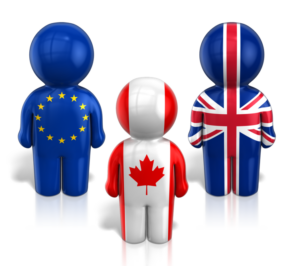The State of Economic Affairs: Canada’s Political Maneuvering in a Global Context

In the current economic landscape, Canada finds itself at a crossroads, influenced by shifting political tides south of the border. As discussions around leadership and strategy heat up, the Conservative Party’s lack of dynamic engagement is raising eyebrows. Instead of capitalizing on political opportunities, they seem to be misfiring, particularly in their response to events surrounding former President Trump.
The Political Climate: A Shift Towards Globalism
A keen observer might notice that Trump’s controversial approach has inadvertently propelled Canadian conservatives closer to globalist ideals. While some may argue that this is a detrimental pivot for the Conservative Party, many Canadians remain blissfully unaware of the broader implications at play. There’s a palpable disconnect—those who resonate with the "woke" narrative often dismiss Trump’s influence, while simultaneously elevating figures like Mark Carney. His portrayal as a "financial wizard" showcases a misleading viewpoint among liberal supporters who believe organizations like the World Economic Forum (WEF) operate as benign think tanks.
The Missed Opportunities
Instead of amplifying a compelling counter-narrative against Carney and shedding light on the intricacies of global governance, Conservative messaging is limited to simplistic slogans like "Axe the Tax." What happened to confronting the larger systemic issues at play? Canada could benefit significantly from a discussion about the WEF’s more controversial aspects, such as their views on population control and urban planning—concepts often dismissed as outlandish but increasingly pervasive.
The Conservative Party could rise to power by spotlighting the elite’s dialogues, particularly those involving Klaus Schwab and Yuval Noah Harari, who have openly questioned the role and value of vast segments of the population. These conversations could serve to forge a clearer understanding of the stakes at hand—not just for Canada, but for the global community.
Alternative Paths Forward
One underexplored angle is the potential for a stronger coalition among alternative political parties. Some suggest that endorsing options like the People’s Party of Canada (PPC) could shift the narrative in favor of more robust economic policies that resonate with the everyday Canadian. Aligning with parties that prioritize individual freedom and economic autonomy could serve to dismantle the notion that Canadian identity is simply a stepping stone into a quasi-globalist alliance.
A Vision for Tomorrow
Ultimately, if we reflect on the notion of Canada as the "51st State," we see an intriguing hypothetical that invites further examination. Had that merger been more than a political soundbite, Canada might have benefited from an enhanced representation within American politics. Instead, we now face a future that could easily become dominated by a Marxist agenda that diminishes economic productivity and technological growth.
At Extreme Investor Network, we believe that the future of Canadian economics hinges not only on immediate political strategies but also on an informed citizenry willing to engage with the complex forces shaping their nation. We encourage our readers to participate in this dialogue—together, we can foster a more nuanced understanding of economics as it intersects with politics.

As we navigate these challenging waters, it becomes increasingly vital to engage in discussions that transcend soundbites and media spectacles. Can counter-narratives be effective? Is there a path that leads the Conservative Party back to relevance? Join us at Extreme Investor Network as we explore these topics and more, offering in-depth insights that aren’t just informative but transformative for the economic dialogues of our time.

